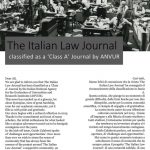I was recently asked to translate a parere pro-veritate by a Roman client. The subject itself was fascinating; the use of property and the specific conditions under which a business license could be granted for a property that had been used by a religious order. The document required not only the requisite linguistic skills and translation expertise and experience, but also an in-depth knowledge of both the Canon law of the Roman Catholic Church and Italian civil law, as well as of the interplay between them.
However, it is not the subject of the translation itself which is the focus of this brief article, but the nature of the parere pro veritate itself. The Italian term means, essentially, an independent opinion, in which a lawyer or legal expert who has no previous connection with the case will provide an impartial (as per the Latin pro veritate, meaning truthful) guide for the client, or even, sometimes, a foreign court which requires authoritative guidance on a point of Italian law.
In fact, the functions of the parere pro veritate are manifold; it may be required in order to attempt to avoid the need for litigation in court, with a legal client intending to use the opinion as the legal basis for a potential settlement.
In other cases, the opinion may precede the commencement of litigation, as it serves an instrumental purpose in assessing the possibility of a positive action that the client intends to undertake. Another use of the opinion is when it is used in a case that is already in progress, for the support of a client’s ongoing case.
Finally, the parere pro veritate serves a useful purpose where there are doubts as to whether a client’s intended course of action is compliant with the law. In such a situation, the parere pro veritate serves as a guideline for action, and enables the client to consider the extent to which they are in danger of suffering adverse legal consequences as a result of their actions.
The opinion will examine the evidence in correspondence with the relevant legal issues and data and arrive at a solution. As its name, pro veritate indicates, the opinion must be drawn up in sole accordance with the truth.
For this reason, it is crucial that the lawyer removes their garb of the staunch defender of their client, and instead objectively examine the crucial issues in a completely impartial manner. The legal specialist must therefore indicate the statutory and case law that is both favourable and unfavourable law, and arrive at a resolution that may not be pleasing to the client.
The drafting of the parere pro veritate may cause a potential problem for the legal professional; should they fail in their task of impartiality, they will betray the nature and function of the pro veritate opinion, by developing a favourable defence for the client. This they should not do, but the issue does indicate which the public may perceive the provision of the parere pro veritate as a potentially hypocritical professional service; the neutrality it requires may be purely stylistic, and ultimately it serves the interest of one party.
As a translation professional, the interpretation, analysis and rendering of the parere pro veritate and the legal issues it covers from Italian into English is, as always, an absorbing exercise.
It requires the understanding of two or even three legal systems (here, Italian Civil law, Church Canon Law, and the English Common Law), knowledge of comparative law, its semantic and cultural connotations and tradition.
Of particular importance is the ability to search for and find the correct equivalent legal terminology for different Italian legal concepts in English, and not to use the equivalent concept in one’s own national legal system – and it is this that encapsulates the ultimate challenge of legal translation.






